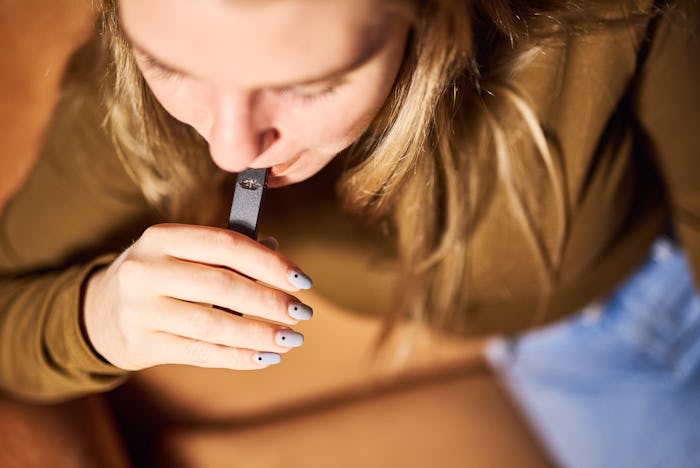News

FDA Will Ban E-Cigarette Pod Flavors That "Appeal To Children" To Address Epidemic
The Trump administration announced Thursday that the Food and Drug Administration (FDA) will ban most flavored e-cigarette products that "appeal to children" in an effort to crack down on young people vaping. The move follows an advisory from the Surgeon General that referred to youth e-cigarette use as an "epidemic."
The FDA plans to prohibit the sale of fruit, candy, mint, and dessert flavors from pod-based e-cigarettes — such as Juul — that are popular with teens. Only tobacco and menthol-flavored cartridges will be allowed to be sold. This new policy also does not apply to large, tank-based vaping devices, which are mostly sold at vape shops aimed toward adult smokers, The Star Tribune reported. Companies now have 30 days to cease the manufacture, distribution, and sale of products that do not comply with the FDA's new enforcement actions.
"The United States has never seen an epidemic of substance use arise as quickly as our current epidemic of youth use of e-cigarettes," Health and Human Services Secretary Alex Azar said in a statement on Jan. 2. "By prioritizing enforcement against the products that are most widely used by children, our action today seeks to strike the right public health balance by maintaining e-cigarettes as a potential off-ramp for adults using combustible tobacco while ensuring these products don’t provide an on-ramp to nicotine addiction for our youth."
"We will not stand idly by as this crisis among America’s youth grows and evolves," the statement continued, "and we will continue monitoring the situation and take further actions as necessary."
It's worth noting exemptions for menthol-flavored e-cigarettes and for flavors made for tank-based devices weren't part of President Donald Trump's initial plan to ban all flavors. According to NPR, Trump vowed in September to ban flavored vaping products in the midst of an outbreak of vaping-related illnesses. He reversed his stance in November as a result of the threat of political backlash, The New York Times reported. In light of Thursday's announcement, organizations have spoken out about where the ban ultimately landed.
"Only the elimination of all flavored e-cigarettes can end the worsening youth e-cigarette epidemic and stop e-cigarette companies from luring and addicting kids with flavored products," Matthew Myers from the Campaign for Tobacco-Free Kids told the Associated Press.
As the U.S. Centers for Disease Control and Prevention (CDC) points out, more than 3.6 million U.S. youth — 1 in 5 high-schoolers and 1 in 20 middle-schoolers — used e-cigarettes in 2018. By 2019, these stats only got worse. A survey published in November 2019 in the Journal of the American Medical Association (JAMA) found that out of 19,018 respondents, 27.5% of high school students and 10.5% of middle school students self-reported e-cigarette use within the past 30 days.
The issue of vaping among youth isn't going away on its own. Changing the age minimum to 21 for purchasing tobacco products, which went into effect last week, seems like a step in the right direction, and so does prohibiting the sale of most e-cigarette flavors in the products used most by young people, though there's still room for improvement.